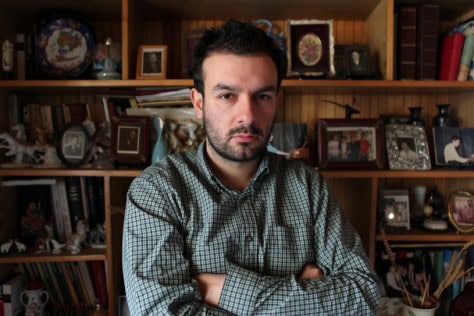I’ve only followed one band in my life. Now twice. And to be honest, I can’t exactly explain what it was about Placebo that first intrigued me when I was a young, Christian college student. I guess, being repressed, the gender bending, naughty lyrics and overt sexuality was fascinating. Unable to explore the bounds of my own liberties, I lived vicariously through them and of course, hid their “secular” CDs in my record collection and appropriately obsessed. This led to some weirdo desire to follow their first West Coast tour years ago, which was an adventure in and of itself as I had no tickets to shows, wound up chatting up the band, was put on the guest list every night and by the last show was doing makeup for the opening act. (All that and still a holy, “waiting ‘til marriage” girl…at the time.)
However, aside from the cross-dressing or drug references, one of the main factors that piqued my initial interest was the rhetorical subtext of their music that revealed a band discovering their identities, exposing their personal struggles in raw form and in a way—that while sometimes shocking—could be identified with by those of us struggling to break out of our own difficult paradigms. And perhaps this is why nearly a decade later I would follow them again. Although, this time from the perspective as a journalist.
As I trail the band from San Diego to Las Vegas to Los Angeles and later New York and Boston, perhaps the first thing I notice is the lack of the over-the-top stage theatrics the band used to be prone to—both on and off stage. In lieu of dresses now, singer Brian Molko, clad in designer button-ups and black pants, performs like someone with something to say and nothing to prove.
He explains, “There’s been a natural relaxing of the gimmicks around Placebo and the shock tactics. I think we’ve really begun to consider ourselves serious artists. We’re finally at ease, so I don’t feel like I have to wear a dress anymore or write songs like “Nancy Boy” or “Pure Morning” to attract attention. It’s kind of a no-frills approach which allows the emotion of the song and musicianship to shine through with less distraction. And I think that comes from being confident in the quality of the songwriting. I think that we just hit a place between Sleeping With Ghosts and Meds where we just really felt like we came into our own as songwriters. Finally, we didn’t feel like we were just this faggy party band but that we actually had something profound to express.”
It is shifts such as this that explain the current incarnation of Placebo. A band that many listeners think they know, but in reality, have quite a few misconceptions about. The irony of rock ‘n’ roll is always amusing. I think most Placebo fans would probably be surprised to know that after the Las Vegas show, rather than party and get high and/or wasted, the band, my photographer Kristin and I hightailed it to the New York, New York casino…just to ride a roller coaster. And that later, a few of us did the perhaps token rock ‘n’ roll thing of walking into a sex club…but found it empty and simply laughed and walked out. Perhaps the most salacious part of my whole trip was encountering a crazed taxi driver who followed up telling Molko and I that “Nat King Cole was nice for a black man” with the query, “So, do you guys like pickles?” As I clutched Brian’s knee in horror, he simply laughed and said, “Yes, big ones.”
For those in the States who aren’t Placebo fans, there are misconceptions regarding Molko’s sexuality, the band being goth and an overall lack of knowledge regarding the fact that they’re well respected and play to stadium-sized crowds nearly everywhere else in the world except here.
If there were a record to set straight, it would be that Placebo present rock ‘n’ roll devoid of false notions of what it means to be rock ‘n’ roll. A theme reflected in their new album Meds through songs like the title track. Remarking on their exposition of typical rock clichés, Molko says, “People are in love from a distance with the cliché of sex, drugs and rock ‘n’ roll. They want to live vicariously through their rock stars and I think the main emphasis of Meds is to break open the clichés and show the public what ten years of abuse does to your head. You lose it pretty much.”
I remark that they probably were close to losing each other. Drummer Steve Hewitt acknowledges this and Molko adds, “When you’ve been given such a gift, it’d be a fucking shame to throw it away and become another cliché”
This humble approach is also revealed in the overwhelming sense of empathy in their new album’s lyrics. When asked what their current goals are from this point onward Molko comments, “It’s interesting that you use the word empathy because Meds is our most empathetic record. In a lot of the [previous] songwriting there wasn’t a great deal of empathy. I think the most powerful music I grew up with was music packed full of empathy and I think we always wanted to make music that was timeless. You have to write something that’s very personal. To create something timeless you have to ignore all movements and trends. I think to be timeless is a goal if any.”
Acknowledging this, I notice that the band’s current set lists are noticeably devoid of radio hits like the catchy friend-with-weed “Pure Morning.” A song that bassist Stefan Olsdal now refers to as “Pure Boring.” The rhymy drug-pop anthem that many still associate the band (and that many fervent fans such as myself don’t care for much) is now far outdated to the band themselves. In fact, they refuse to play it.
Hewitt succinctly notes, “If you can’t put your heart and soul into it then it’s pointless.”
Molko adds, “Yeah, just because we wrote it doesn’t mean we have to play it.”
This notion of having a need to get behind the songs they perform live is something reiterated time and again in the band’s casual conversations with me. I find it admirable and interesting that they would have the balls to not play one of the few songs that had major radio play for them in the States only to remain true to themselves.
And perhaps from my behind-the-scenes perspective, it is this sense of ethics and empathy that invokes my sense of evangelism again. I simply wish for others to see Placebo as they are and not what they’ve been typified as. As with any band, I witness bad moods and drunken moments while I’m with them, but I also witness a lot more poignant interactions. Discussions about what it means to love, thoughts about the state of music and a genuine concern for each other as bandmates.
It’s obvious to me now that artists ranging from David Bowie to Michael Stipe have worked with them. And it’s also clear that they truly have progressed beyond the clichés and bullshit gimmicks of their earlier years. Although, the razor sharp tongues that fans love them for are certainly still in effect as my interview ends with Molko sarcastically quipping to me that their next record is going to be “a gay country record [because] it’s a genre that hasn’t been explored enough in modern music. It’ll be kind of like a cross between The Village People and Johnny Cash.”
Without missing a beat, Olsdal adds, “Yes, and we’ll be in Speedos and Stetsons.”
Well, I might just have to follow them a third time then.
“Finally, we didn’t feel like we were just this faggy party band but that we actually had something profound to express.”
 Q&A with Larry Gus
Q&A with Larry Gus We Own the Night: The Edison
We Own the Night: The Edison
No Comments